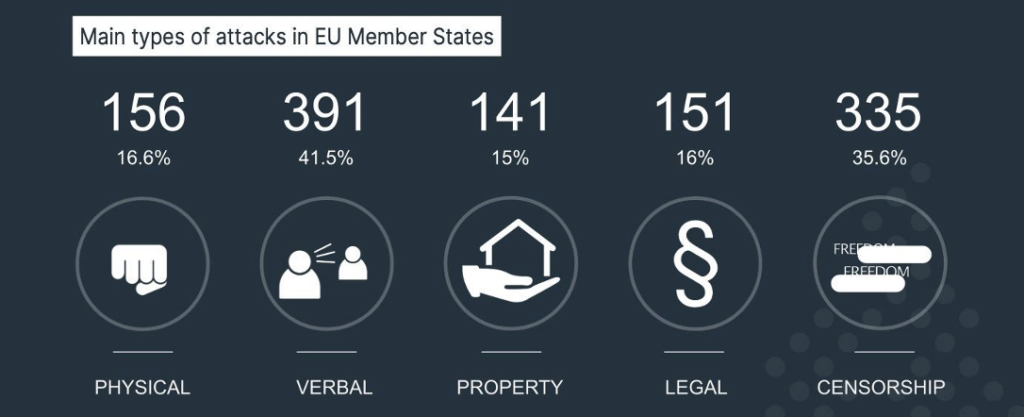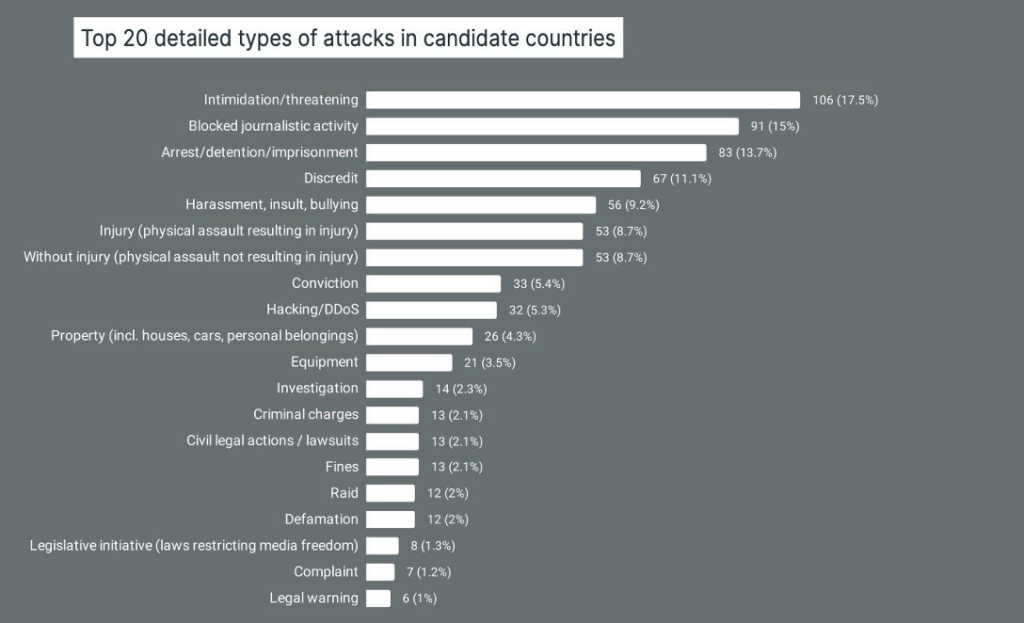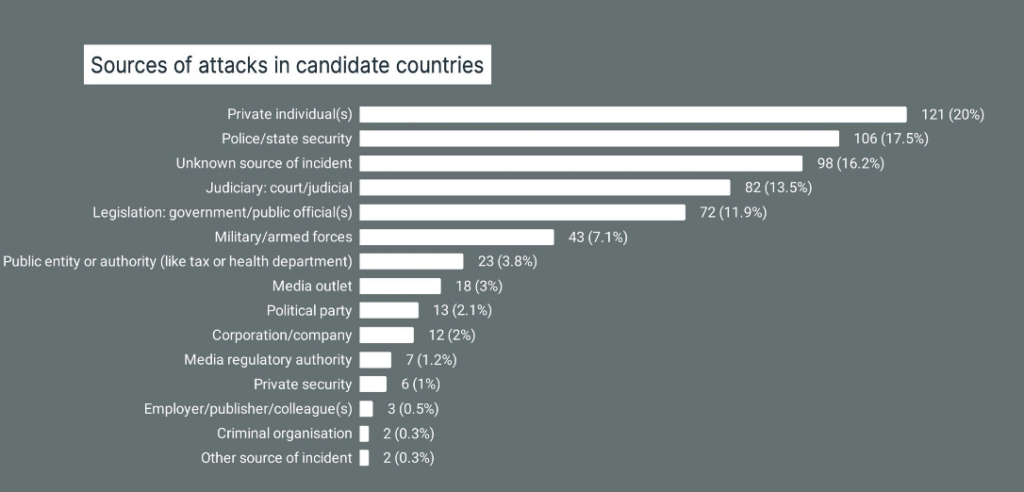Media freedom is a fundamental pillar of democracy, yet across Europe, journalists are facing increasing threats, censorship, and violence. The Mapping Media Freedom – Monitoring Report 2024 analyses the press freedom situation in 35 European countries, including the 27 EU Member States and nine countries with EU candidate status, shedding light on the state of press freedom and the growing risks for those in the media industry. While concerns exist across the continent, Turkey emerges as one of the most restrictive environments, where journalists work under immense political and legal pressure.
Between January and December 2024, Mapping Media Freedom (MapMF) documented 1,548 press freedom violations targeting 2,567 media-related persons or entities. The trends observed in 2024 indicate a continued deterioration of media freedom in key areas. The sharp rise in verbal attacks and censorship and interference in the EU is alarming, particularly with blocked journalistic activity seeing a significant increase. Meanwhile, in candidate countries, verbal attacks have become the dominant form of press freedom violations, with legal threats disproportionately affecting media workers, highlighting broader concerns about judicial independence and legislative restrictions. The continued rise in online attacks, alongside the increasing role of unknown perpetrators, underscores the evolving threats faced by journalists in the digital age.
In the 27 EU Member States, MapMF reported 942 alerts impacting 1,446 persons or entities related to media. Journalists and media workers were subjected to an increased number of threatening and intimidation, blocked journalistic activities, editorial interference, as well as spoofing, including deep fakes.

Between the nine candidate countries, MapMF recorded 606 alerts, impacting 1,121 individuals or entities connected to the media during the reporting period. These countries share similar press freedom challenges as those in EU Member States, although differences in the frequency and severity of incidents are evident. The most common forms of attack in candidate countries are intimidation and blocking of journalistic activity, with 106 and 91 alerts respectively, accounting for 17.5% and 15% of incidents. Arrests, detentions, and imprisonments follow closely with 83 cases (13.7%), predominantly recorded in Turkey and Georgia. Private individuals are the most frequent perpetrators of press freedom violations, responsible for 121 incidents (20.0%), while police and state security forces are involved in 106 cases (17.5%), also primarily in Turkey and Georgia. The judiciary also stands out as a significant source of attacks, with 82 recorded incidents, most notably in Turkey. Additionally, 53 physical attacks resulting in injuries were documented, mainly in Georgia and Ukraine.


In Turkey, press freedom faced significant challenges in 2024, with a variety of physical, legal, and online threats directed at journalists. According to MapMF, journalists covering elections were frequently subjected to physical violence, with over half (59.1%) of the incidents involving police or state security officers. After the local elections, journalists in eastern Turkey were attacked and obstructed by the police while covering protests against the electoral decision to block the newly elected mayor of Van, Abdullah Zeydan. Several journalists were also detained during these protests. In another incident, journalists from Anadolu Agency, Demirören News Agency, and İhlas News Agency were shot at by unknown perpetrators while covering a dispute at a local ballot box in the Sur district of Diyarbakır. Fortunately, no injuries were reported as the journalists quickly fled the scene.
In addition to physical violence, journalists in Turkey faced significant legal threats. MapMF recorded a total of 135 press freedom violations involving 317 media-related persons or entities during 2024. Legal threats, including defamation lawsuits and investigations, were used as tools to silence critical reporting, particularly around sensitive issues such as environmental and climate reporting. Journalists were investigated by police due to their work on environmental issues, reflecting the government’s broader efforts to control and restrict media coverage. The use of legal actions to target journalists for their work has become a common tactic, with many facing accusations of “spreading terrorist propaganda” or “insulting the president and public officials.” Furthermore, journalists reporting on the death of the leader of the Gülen movement, which Turkey labels as a terrorist organization, were also targeted by authorities.
Turkey’s record on jailing journalists remains one of the worst globally, with 51 documented cases of arrests, detentions, or imprisonment. Of these, 128 journalists were involved, and at the time of publication, 18 journalists were incarcerated. Arrests were often carried out through mass detentions and dawn raids, with authorities targeting both domestic and foreign journalists. Additionally, at least 32 journalists faced prison or suspended sentences for their work, with some receiving lengthy sentences related to terrorism charges. In one particularly alarming case, eight journalists from Mezopotamya Agency were sentenced to up to six years and three months on terrorism-related charges. The monitoring period also saw at least 11 journalists receiving death threats, including investigative journalist Murat Ağırel, who reported receiving a death threat after his reporting.
The re-introduction of the ‘agents of influence’ bill in Turkey added further strain on press freedom. This controversial bill, which would increase sentences for crimes aligned with foreign states or organizations, was criticized for its potential to be used against journalists. The bill was mischaracterized as an effort to increase transparency in foreign funding but actually aimed to treat individuals deemed to be acting in the interest of foreign powers as spies. While discussions on the bill were postponed in November following backlash from civil society and journalists, it remained a significant threat to press freedom.
The online threats against journalists also continued to rise, with an increase in online attacks and the role of unknown perpetrators. Turkish authorities routinely blocked access to news websites and social media platforms that offered critical coverage, contributing to an increasingly restrictive media environment. In one significant instance, the government-controlled media regulator, RTÜK, revoked the broadcasting license of the independent radio station Açık Radyo and imposed a broadcast ban on it. Kurdish journalists and media outlets were particularly targeted, with journalists Nazım Daştan and Cihan Bilgin killed in a suspected Turkish drone strike while reporting on military clashes in Syria. In response to these killings, nearly 40 journalists were detained for protesting, with seven later arrested on charges of “propaganda.”
These events reflect a continued and troubling trend in Turkey, where press freedom violations remain rampant, and journalists face a dangerous combination of physical violence, legal threats, online harassment, and state-controlled censorship.
Yazar: Selin Demir





